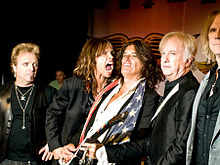
Back Música de la dècada del 1970 Catalan 70. léta v hudbě Czech שנות ה-70 של המאה ה-20 במוזיקה הפופולרית HE 1970年代の音楽 Japanese 1970-е годы в музыке Russian 1970-ті в музиці Ukrainian
This article needs additional citations for verification. (September 2009) |
This article may require cleanup to meet Wikipedia's quality standards. The specific problem is: This article needs cleanup to comply with the Manual of Style. (August 2022) |
This article includes an overview of the major events and trends in popular music in the 1970s.

In North America, Europe, and Oceania, the decade saw the rise of disco, which then went on to become one of the biggest genres of the decade, especially in the mid-to-late 1970s.[4] In Europe, a variant known as Euro disco[4] rose in popularity towards the end of the 1970s. Aside from disco, funk, soul, R&B, smooth jazz, and jazz fusion remained popular throughout the decade. Rock music played an important part in the Western musical scene, with punk rock thriving throughout the mid to late 1970s.[5]
Other sub-genres of rock, particularly glam rock,[6] hard rock, progressive rock, art rock, blues rock, and heavy metal achieved various amounts of success. Other genres such as reggae were innovative throughout the decade and grew a significant following.[7] Hip hop emerged during this decade,[8] but was slow to start and did not become significant until the late 1980s. Classical began losing a little momentum; however, through invention and theoretical development, this particular genre gave rise to experimental classical and minimalist music by classical composers. A sub-genre of classical, film scores, remained popular with movie-goers.
Alongside the popularity of experimental music, the decade was notable for its contributions to electronic music, which rose in popularity with the continued development of synthesizers and harmonizers; more composers embraced this particular genre, gaining the notice of listeners who were looking for something new and different. Its rising popularity, mixed with the popular music of the period, led to the creation of synthpop. Pop also had a popularity role in the 1970s.
In Africa, especially Nigeria, the genre known as Afrobeat gained a following throughout the 1970s.[9]
In Latin America and the Iberian Peninsula, the Nueva canción movement peaked in popularity and was adopted as the music of the hippie, Liberation Theology, and New Left movements. Cumbia music began its internationalization as regional scenes rose outside Colombia. Merengue experienced mainstream exposure across Latin America and the southern US border states.
In Asia, music continued to follow varying trends. In Japan, the decade saw several musical trends, including pop music, folk music, rock music, disco music, while rock group The Spiders disbanded in 1970.[10]
- ^ "Aerosmith | Biography, Music & News". Billboard. Retrieved March 31, 2024.
- ^ Stephenspublished, Karl (February 21, 2024). "Slash reminisces about the band who inspired his journey through rock'n'roll". louder. Retrieved March 31, 2024.
- ^ Dohertypublished, Niall (June 18, 2023). ""He was pretty quiet. He just wanted to hang out": Joe Perry remembers when Kurt Cobain met Aerosmith". louder. Retrieved March 31, 2024.
- ^ a b "AllMusic | Record Reviews, Streaming Songs, Genres & Bands". AllMusic. Archived from the original on October 15, 2011. Retrieved October 30, 2011.
- ^ "AllMusic | Record Reviews, Streaming Songs, Genres & Bands". AllMusic. Archived from the original on September 3, 2011. Retrieved June 14, 2012.
- ^ Auslander, Philip (2006). Performing Glam Rock: Gender and Theatricality in Popular Music. University of Michigan Press. p. 49.
- ^ "Contemporary Reggae Music Genre Overview". AllMusic. Archived from the original on November 3, 2011. Retrieved October 30, 2011.
- ^ "Hip-Hop/Urban Music Genre Overview". AllMusic. Archived from the original on November 3, 2011. Retrieved October 30, 2011.
- ^ "Afro-beat Music Genre Overview". AllMusic. Archived from the original on January 3, 2012. Retrieved November 21, 2011.
- ^ Martin C. Strong; Brendon Griffin (18 September 2008). Lights, Camera, Soundtracks: The Ultimate Guide to Popular Music in the Movies. Canongate Books. p. 338. ISBN 978-1-84767-003-8.
